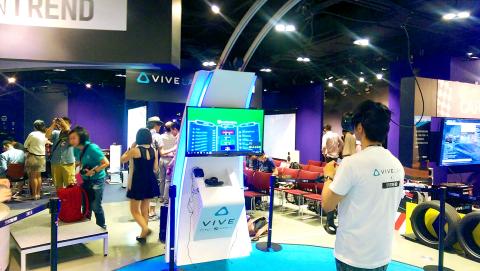HTC Corp (宏達電) and Syntrend Creative Park (三創園區) have jointly invested NT$10 million (US$316,086) in building a virtual reality (VR) arcade in Taipei, that is set to open tomorrow, in an effort to expand HTC’s VR business and attract more consumers to the park.
“Our plan is to establish a new business model and generate NT$2 million in revenue per month at the Viveland in Syntrend,” HTC vice president of virtual reality Raymond Pao (鮑永哲) told a news conference in Taipei.
This is HTC’s first direct investment in a VR theme arcade since the company launched its Vive headsets worldwide in April.

Photo: CNA
The company invested between NT$4 million and NT$5 million, and Syntrend funded the rest for the project, Pao said.
HTC is in talks with large electronics store operators in the US, China and Japan to build similar VR theme parks there, he said.
The ticket prices for different zones and booths within Vivland range from NT$150 to NT$400 for 15 minute to 30 minute sessions.
Viveland could become profitable in one year after its launch, said Syntrend business vice president Ray Wang (王國瑞), who estimated the arcade could attract 500 to 700 consumers per day during weekdays and 1,000 to 1,500 per day on weekends.
Yuanta Securities Investment Consulting Co (元大投顧) said running a VR arcade is a positive strategy for HTC to directly introduce its devices to more consumers.
However, Yuanta analyst Jeff Pu (蒲得宇) said he remains conservative about the sales momentum of HTC Vive this quarter, due to its high price tag and complicated installment.
“We forecast Vive shipments this quarter will only grow slightly from last quarter on seasonal demand during the Christmas holidays,” Pu said by telephone.
Despite the company’s continuous investments in the VR business, smartphones remain a major revenue driver for HTC, accounting for more than 90 percent of the company’s total revenues last quarter, according to Yuanta’s estimates.
Pu said he expects HTC’s smartphone shipments this quarter to decline from last quarter, as HTC’s new models are not competitive enough.
Pu forecast HTC’s revenues could climb 13.2 percent to NT$25.16 billion from last quarter’s NT$22.23 billion, supported by VR shipments and contributions from Google’s Pixel smartphones, which are manufactured solely by HTC.
HTC on Tuesday posted a smaller-than-expected net loss of NT$1.8 billion, or NT$2.18 per share, for last quarter, and the company’s president of smartphone and connected devices business Chang Chia-lin (張嘉臨) expressed optimism over this quarter on holiday demand.
Macquarie Capital Ltd still holds a downbeat view on HTC.
In a note to clients on Tuesday, Macquarie said HTC could report continuous operating losses through 2018, citing smartphone market challenges and further investment in expanding VR developers and the forming of an ecosystem, which tends to drag operational profitability.
Shares of HTC yesterday dropped 1.28 percent to NT$92.5 in Taipei trading, underperforming the TAIEX, which fell 0.67 percent.

Greek tourism student Katerina quit within a month of starting work at a five-star hotel in Halkidiki, one of the country’s top destinations, because she said conditions were so dire. Beyond the bad pay, the 22-year-old said that her working and living conditions were “miserable and unacceptable.” Millions holiday in Greece every year, but its vital tourism industry is finding it harder and harder to recruit Greeks to look after them. “I was asked to work in any department of the hotel where there was a need, from service to cleaning,” said Katerina, a tourism and marketing student, who would

i Gasoline and diesel prices at fuel stations are this week to rise NT$0.1 per liter, as tensions in the Middle East pushed crude oil prices higher last week, CPC Corp, Taiwan (台灣中油) and Formosa Petrochemical Corp (台塑石化) said yesterday. International crude oil prices last week rose for the third consecutive week due to an escalating conflict between Israel and Iran, as the market is concerned that the situation in the Middle East might affect crude oil supply, CPC and Formosa said in separate statements. Front-month Brent crude oil futures — the international oil benchmark — rose 3.75 percent to settle at US$77.01

Merida Industry Co (美利達) has seen signs of recovery in the US and European markets this year, as customers are gradually depleting their inventories, the bicycle maker told shareholders yesterday. Given robust growth in new orders at its Taiwanese factory, coupled with its subsidiaries’ improving performance, Merida said it remains confident about the bicycle market’s prospects and expects steady growth in its core business this year. CAUTION ON CHINA However, the company must handle the Chinese market with great caution, as sales of road bikes there have declined significantly, affecting its revenue and profitability, Merida said in a statement, adding that it would

UNCERTAINTIES: The world’s biggest chip packager and tester is closely monitoring the US’ tariff policy before making any capacity adjustments, a company official said ASE Technology Holding Inc (日月光投控), the world’s biggest chip packager and tester, yesterday said it is cautiously evaluating new advanced packaging capacity expansion in the US in response to customers’ requests amid uncertainties about the US’ tariff policy. Compared with its semiconductor peers, ASE has been relatively prudent about building new capacity in the US. However, the company is adjusting its global manufacturing footprint expansion after US President Donald Trump announced “reciprocal” tariffs in April, and new import duties targeting semiconductors and other items that are vital to national security. ASE subsidiary Siliconware Precision Industries Co (SPIL, 矽品精密) is participating in Nvidia